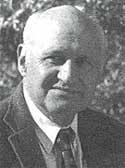
As research fellows at Duke’s Center for the History of Political Economy, this summer we processed the papers of Martin Shubik, emeritus professor of mathematical institutional economics at Yale University. By arranging and describing Shubik’s life-long correspondence, his class notes from the time of his graduate training at Princeton in the late 1940s, files of professional engagements, as well as materials related to nearly all of his published works, we had the chance to get an overview of Shubik’s distinguished career as an academic and a practicing economist during an important historical period encompassing the Cold War years in the United States.
While Shubik was born in New York City in 1926, he received his early education in England. After moving to Canada, he graduated with a B.A. in mathematics and subsequently with an M.A. in political economy from the University of Toronto in 1947. Equipped with this background, Shubik arrived at Princeton University in 1949, where the archival record begins. He received a Ph.D. in economics in 1953 under the supervision of Oskar Morgenstern, one of the founding fathers of game theory. The influence of his supervisor becomes apparent in Shubik’s collection, not only through the class notes Shubik took of Morgenstern’s lectures and in the correspondence with him throughout the years, but also indirectly through Shubik’s life-long contributions to game theory and its application to economic problems. And, like Morgenstern, Shubik frequently voiced a critical attitude towards purely theoretical work.
Shubik’s collection is a treasure-house of primary resources on economics, especially for researchers interested in the early years of game theory. Shubik was part of an inspiring group of students during his stay at Princeton, including Harold Kuhn, John McCarthy, John Milnor, John Nash (Nobel Prize, 1994), Norman Shapiro, and Lloyd Shapley (Nobel Prize, 2012), who were pioneers in the field of game theory and would continue to shape the history of American mathematical economics during the second half of the 20th century. Innumerable drafts of Shubik’s collaborative works, often accompanied by correspondence and research notes by his co-authors, afford an inspiring set of resources evoking that historical period. The collection contains Shubik’s and Shapley’s drafts and notes on their joint works on game theory, from their early papers in the 1950s to their collaboration during the 1970s at the RAND corporation. The collection also allows for personal glimpses into Shubik’s life. For example, Shubik’s life-long friendship and professional collaboration with Shapley is reflected in the extensive correspondence throughout their academic careers. Similarly, Shubik’s exchanges with Nash (sometimes through humorous cards and joke letters) offer a unique source for historians interested in the early years of game theory and the history of modern economics.
While Shubik made fundamental contributions to mathematical economics, the collection shows that his interests were not confined to academia. Very early in his career, he took on consultancy positions for companies including General Electric and the Watson Research Lab of IBM. He also took on research and teaching responsibilities outside of the U.S., participating in projects such as the Cowles Commission’s research on simulation modeling in Latin America. The collection also contains a large amount of correspondence, trip reports, memoranda, and conference invitations that reflect Shubik’s professional development as an expert in the strategic analysis of warfare. More generally, the material reflects not only the increasing use of mathematical methods in American economics during the Postwar period, but also affords insights into the actual application of those new theoretical tools to specific problems that economists were concerned with during that time, and the institutional context within which those undertakings were embedded.
The papers of Martin Shubik reveal the mosaic of the career of an exceptional and multi-faceted economist during a highly charged professional and political climate, and the degree to which the field of economics is built on collaborative research. In short, it is a must for any historian interested in the origins of modern economics.
Post contributed by Catherine Herfeld and Danilo Silva, research fellows at Duke’s Center for the History of Political Economy.
Reminder: The Rubenstein Library is closed until Jan. 7!




2 thoughts on “The Martin Shubik Papers: From Early Game Theory to the Strategic Analysis of War”
Comments are closed.